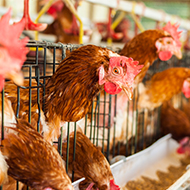Livestock worrying cost rises almost 30 per cent
The cost of livestock worrying was highest in the South West of England.
Farm animals worth an estimated £2.4 million were severely injured or killed in dog attacks in 2023, according to data released by the insurance company NFU Mutual.
The figure is nearly 30 per cent higher than the previous year and is part of a trend of increasing livestock worrying. Between 2019 and 2022, the cost of dog attacks grew by 50 per cent.
The South West of England was the worst hit region, with dog attacks there costing an estimated £359,000.
A survey of dog owners by the insurer also found that more owners were letting their dog off its lead when in the countryside, with the number rising from 64 per cent the year before to 68 per cent. Only 22 per cent said they would report an attack to a local farmer and just 11 per cent said they would call the police.
Efforts are currently being made in Parliament to tackle the issue, with the government supporting a bill that will give the police more powers to deal with livestock worrying and increase the number of species covered by the law.
The new legislation has been welcomed by the British Veterinary Association.
BVA junior vice-president Elizabeth Mullineaux said: “It’s concerning to see such a significant rise in livestock worrying incidents.
“As vets, we see first-hand the devastating damage caused when dogs are not kept under control around livestock, which is why following years of BVA pushing for action on this issue, the government’s recent support for the new livestock worrying bill is a positive step forward.
“The bill includes vital updates to the existing legislation and will bring it in line with BVA’s manifesto asks, such as clarity on what constitutes ‘worrying’, who would be responsible for the dog’s behaviour if the owner is not present at the time of the incident, and the expansion of police powers and sanctions against irresponsible dog owners.”
Image © Shutterstock



 An Avian Influenza Prevention Zone (AIPZ) has been introduced across Wales.
An Avian Influenza Prevention Zone (AIPZ) has been introduced across Wales.